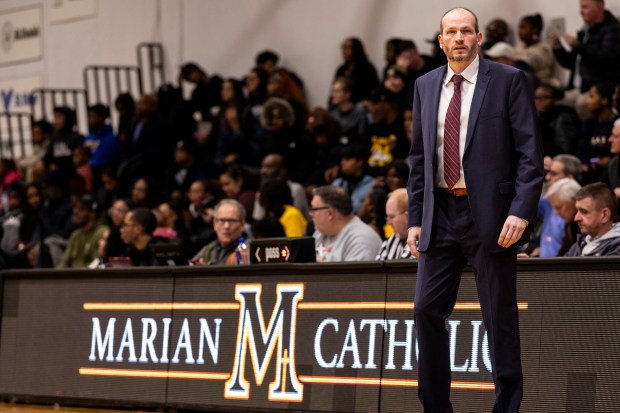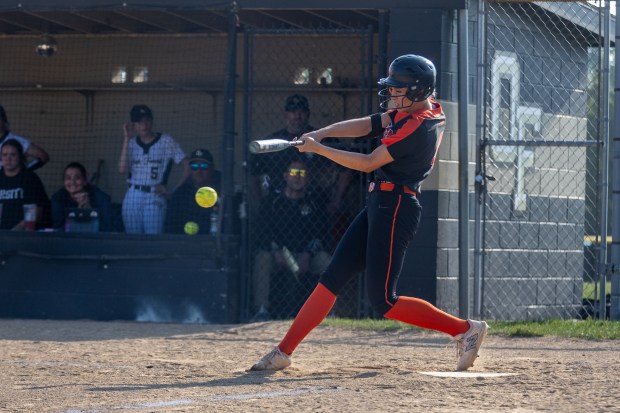Federal prosecutors late Monday revealed a muted initial response to the bombshell U.S. Supreme Court decision that could directly affect some of the counts in the case against former Democratic Illinois House Speaker Michael Madigan.
They do not intend to seek a superseding indictment against the former political juggernaut from the Southwest Side, a court filing states. And neither prosecutors nor defense attorneys want to delay the trial from its scheduled October start date.
The joint filing suggested deadlines for legal briefs related to the Supreme Court’s 6-3 ruling last month that a federal statute — commonly known as 666 after its number in the federal criminal code — does not criminalize “gratuities,” gifts given to elected officials to express thanks for taking a favorable action.
Madigan, who gave up his legislative seat when toppled from the speakership in 2021, is charged in a scheme that he ran his state and political operations like a criminal enterprise while utility giants ComEd and AT&T put his cronies on contracts requiring little or no work.
ComEd allegedly also heaped legal work onto a Madigan ally, granted his request to put a political associate on the state-regulated utility’s board and distributed bundles of summer internships to college students living in his Southwest Side legislative district.
Madigan and co-defendant Michael McClain, a former ComEd lobbyist, have denied wrongdoing.
The update Monday followed the request of U.S. District Judge John Robert Blakey, who ordered both sides in the case to meet on the issues and report back — including whether they should proceed with pending motions to dismiss and if the U.S. attorney’s office would seek a superseding indictment.
Blakey emphasized that even though the Supreme Court threw a wrench into Madigan case, the judge wants to keep matters on track for its scheduled trial date in October.
The joint filing also raised the possibility that Madigan, who served in the House for half a century, would file a motion closer to the trial to “allow for the fullest possible evaluation of pretrial publicity that continues to occur every day.”
The government and both defendants also signaled support for keeping the identities of the jurors away from the public and media during the trial. They argued confidentiality followed guidelines set out in the high-profile trial of ex-Gov. Rod Blagojevich, who went to prison over the attempted sale of the U.S. Senate seat vacated in 2008 by President-elect Barack Obama.
Then-President Donald Trump, a Republican, later commuted the former Democratic governor, shortening his 14-year sentence to the roughly eight he served.
“Given the unique circumstances of this case, the court should find that juror names should remain confidetial, until the day after the any verdict,” according to Monday’s joint filing.
The Supreme Court’s decision will reverberate significantly in Chicago, where federal prosecutors have used the 666 statute for years to bring political corruption indictments, including against Madigan. As many as five of the 23 overall counts facing Madigan were considered similar to those the high court undercut.
Obtaining a superseding indictment — which would require the usual approvals from the U.S. Justice Department in Washington because of Madigan’s status as an ex-public official — would have been complicated given hoops that would need to be cleared with the U.S. Justice Department when taking action against a former high-ranking official like Madigan.
Madigan, who led the state Democratic Party for more than two decades and served a record 36 years as the leader of the House, was charged in March 2022 with participating in an array of bribery and extortion schemes from 2011 to 2019 aimed at using the power of his public office for personal and political gain.
McClain is a former state legislator, became a longtime Madigan confidant and worked as a lobbyist for several clients, including utility giant Commonwealth Edison. McClain was convicted last year of orchestrating an alleged bribery scheme by ComEd as part of the “ComEd Four” case. That same alleged scheme forms the backbone of the pending case against Madigan and McClain.
Among counts pending against Madigan that involved the 666 statute was a pivotal conversation from August 2018 when Madigan met in his downtown Chicago law office with then-Ald. Danny Solis, 25th, to discuss Solis’ appointment to a lucrative state board position.
Solis, who unbeknownst to Madigan was an FBI mole, made it clear he had helped bring law business to Madigan and wanted something in return once he retired from City Hall, perhaps a position with the Commerce Commission or Labor Relations Board, which Solis said were both “very generous in their compensation,” according to federal prosecutors.
“Don’t worry about it,” Madigan allegedly said during the conversation, which was secretly being videotaped by Solis. “Just leave it in my hands.”
In addition to the Solis board appointment, the statute was used to charge an alleged scheme to steer a ComEd board seat to Democratic political operative Juan Ochoa, payments ComEd made to former 13th Ward Ald. Frank Olivo, former 23rd Ward Ald. Michael Zalewski and others, and an alleged push by Madigan to win law business from the developers of a parcel in Chinatown.
Both ComEd and AT&T have entered deferred prosecution agreements with the U.S. attorney’s office in which they have acknowledged culpability. ComEd agreed to a $200 million fine and AT&T agreed to a $23 million fine. The government agreed to drop pending charges of bribery against both companies once their cooperation is complete.
The high court’s decision in 666 drew criticism from proponents of good government who worried the sweeping ruling would loosen the guardrails in a city and state where corrupt public officials have marched steadily to federal prison.
mcrepeau@chicagotribune.com
rlong@chicagotribune.com
jmeisner@chicagotribune.com




